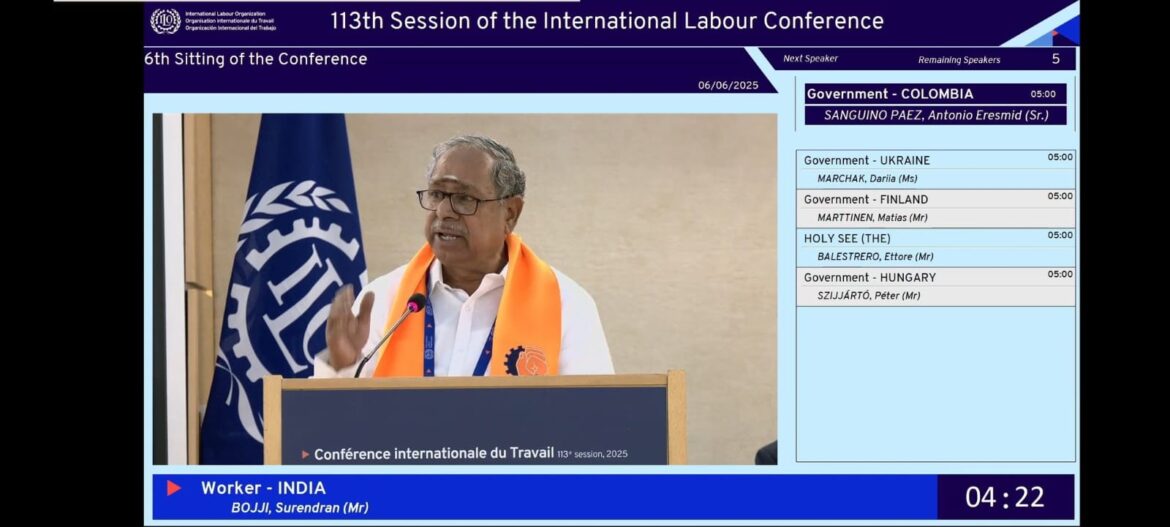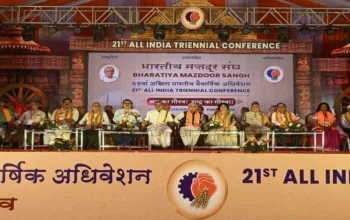https://youtu.be/c2ws43jF2KA?si=SdXvUp-voEtzkZey
The legacy of 106 years of the ILO reminds us of our collective responsibility to uphold decent work, dignity and social justice for all workers. At this pivotal time, the Director-General’s report “Toward a Renewed Social Contract” aptly reminds us of the urgent need to restore trust, reinforce social dialogue, and advance equity in the world of work.
India is a country where the dignity of physical labour is deeply woven into our cultural and philosophical heritage. However, today, we witness a world where labour is undervalued and poorly compensated. Even in government sectors, contract labour is on the rise.
Labour migration, both within and across borders, remains a subject of global concern. Gaps in legal frameworks, lack of adequate and robust legal protection, weak enforcement, violations of ILO standards, and limited access to social protection continue to place many migrant workers, particularly those in the informal sector, in precarious and vulnerable conditions. Migrant workers often face precarious employment, weak legal enforcement, and blatant violations of ILO labour standards.
We urge the ILO to address two vital issues: (1) the international portability of social security funds, and (2) Global parameters for skill certification. These steps would enhance labour mobility and promote inclusive growth.
The need for fair treatment, dignity, and respect for all categories of workers, including gig and platform workers, is a universal requirement. They also endure low wages, job insecurity, lack of social benefits, gender bias, long hours of work, and unsafe conditions, often promoted by large industries and multinational corporations. It is important that the operations of MNCs consistently align with national laws and international labour standards.
BMS pursues a policy of “protest and dialogue”, where the government’s good initiatives are openly appreciated and any adverse measures affecting labour are vehemently opposed. Recent government initiatives such as the registration of over 386 million informal workers through the “e-Shram” portal, the extension of social security to nearly 48% of citizens, the provision of 26 weeks of paid maternity leave for women workers, and the inclusion of gig and platform workers under the Social Security Code reflect advancements towards inclusive labour governance. The platform economy is expanding rapidly, creating new livelihoods. Provinces like Karnataka and Rajasthan have initiated some legal measures in this direction. We welcome these efforts.
The rapid evolution of artificial intelligence and digital technologies presents both opportunities and risks. Rapid industrial and technological advancements, particularly in the field of artificial intelligence (AI), present significant challenges for workers, employers, and governments. All nations must establish regulatory frameworks to prevent job displacement while harnessing the benefits of AI.
Gender equality, another priority area highlighted in the Director-General’s report, deserves renewed attention. Priorities must include gender justice, women-related workplace safety, work-life balance, equal pay for equal work, and recognition of unpaid care work.
The emerging concept of Responsible Business Conduct (RBC) benefits both employers and employees. RBC must become the norm, not the exception. It will bring a new work culture to the labour sector. We highlight the ILO Director-General’s recent report, noting that “trust in institutions is fading.” This trust deficit needs to be addressed.
We express our support for the Global Coalition for Social Justice and encourage wider and deeper collaboration among all stakeholders. Let us seize this opportunity to reaffirm our collective commitment to building a just, resilient, and human-centred future of work.
We place our appreciation on the commendable efforts in the ILO’s ongoing tripartite activities. All its efforts must reflect today’s realities while preserving the core values that have guided the ILO since its incepti





